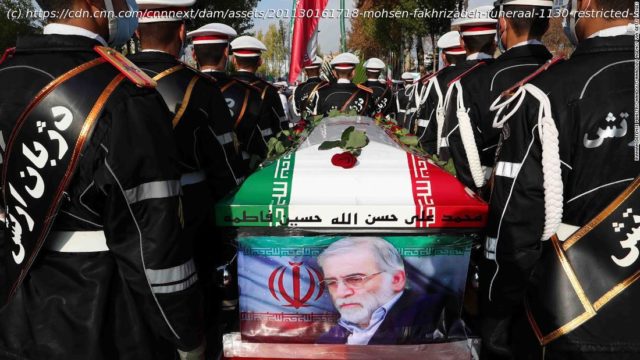Days after the assassination of Iranian nuclear scientist Mohsen Fakhrizadeh, the country’s state media painted an elaborate picture of the killing that makes it sound like something straight out of a second-rate spy movie.
Fars reported that Fakhrizadeh heard what sounded like bullets hitting his car and decided to investigate for himself. When he got out of the vehicle, he was shot at least three times from a Nissan car that was approximately 150 meters (164 yards) away — the length of one and a half football fields. The Nissan then exploded. The entire event lasted three minutes, the news agency said. The semi-official Iranian Students News Agency reported that Fakhrizadeh’s car was hit by gunfire, followed by an explosion and more gunfire. IRIB, a state television outlet, reported that the explosion happened first, followed by gunfire from attackers. The technology is not actually that far-fetched, according to intelligence and security experts who spoke with CNN — but they are skeptical that such a sensitive and precise operation would have been carried out remotely. A remote operation carried out from a distance certainly has its advantages, but three experts suggest that it introduces more risk factors into an operation with little apparent room for error. “Generally speaking, it (a remote weapon) is a device that can be effective in certain circumstances,” said an Israeli security expert who wished to remain anonymous because of the sensitivity of the issue. “You solve the problem of getting too close to the target,” he explained. “It’s accurate enough. You can practice a lot. And you can create a stable situation when there are lots of moving parts.” Iran claims it has evidence that Israel was behind the assassination of Fakhrizadeh, one of the country’s top nuclear scientists, but it has not presented any of its evidence, and Israel has not claimed responsibility. Prime Minister Benjamin Netanyahu’s office has refused to comment on Fakhrizadeh’s death. If the assassination was carried out remotely, either from another country or from a distance of a few kilometers, it would have been immensely complex, with much of the risk coming before the killing itself happened. A country or actor would have to smuggle in valuable technology, including communications relays, satellite receivers and a weapon that could be operated remotely, experts say. To avoid immediate detection, the equipment would probably have to be smuggled in piecemeal and assembled once inside Iran. Throughout the process, the equipment would have to be secretly stored somewhere.
Home
United States
USA — Science Intelligence and security experts skeptical of claims that Iranian nuclear scientist was...






